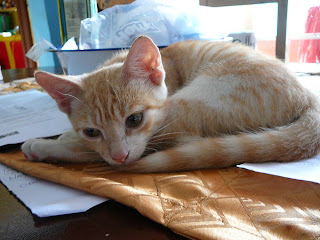I arrived in Freetown on October 24 after uneventful flights from Toronto to London (6 hrs), a 4 hour stopover, and then London to Freetown (6.5 hrs). The VSO driver transported me to the house I am staying in with other volunteers for a few days while I'm attending orientation. The other volunteers are taking very good care of me. We spent the weekend going to the beach (beautiful beaches!), hanging out at restaurants & bars, and exploring the neighbourhood.
I've eaten at restaurants since I got here because none of us like to cook and the availability of foods that we are familiar with is not great. In Freetown, we can get some things, such as peanut butter, cornflakes, and "herbal essences" shampoo at the supermarkets, which are primarily owned by Lebanese people. These items are about the same price as they are in Canada, so it's really expensive on the limited volunteer budget. The local foods are readily available in markets and stands along the street, but we either don't know how to prepare it or we're nervous about how safe the food is. It's going to be an adventure trying to feed myself;-)
The temperature has been very hot and it's quite humid. Most of the time, I'm sweating while just sitting still. It takes a lot of energy just to walk around. It's no wonder that things move at a slower pace here.
The house I am staying in in Freetown for a few days has electiricity from morning until 6pm, and then we have to use candles and flashlights at night. There's running water and a toilet, but very little pressure. We take cold showers because it's expensive to heat the water. We can cook (if we want to) on a gas stove. Another huge challenge is that there is no refrigeration, so we must eat anything that is perishable right away. The cockroaches and insects are plentiful, but I haven't had to deal with any in the last couple of days. The girls have figured out how to keep them at bay. I'm just waiting to slip into bed with a nice giant cockroach!!
Freetown is very congested with people and buildings. The streets are very narrow and it's treacherous for both pedestrians and motorists. The traffic in the center of town is horrible. This is what I've been most overwhelmed with is the crowding. The roads are made of dirt and in horrible condition. There is a lot of garbage everywhere and a lot of people selling goods at roadside stands everywhere. I don't think they have garbage collection. Many local people don't have running water or electricity in their homes. A lot of people live in little shanty-type houses. Many people use cell phones for communication because the land lines are unreliable and expensive. The internet is pretty widely available and the connections aren't too bad. The electricity flickers on and off all day. The people who live near influential people are lucky because the services are better to those areas.
I've had one encounter where I was very nervous.... another volunteer, Chloe, and I were on taking a taxi to restaurant, and we were stopped by someone who claimed to be from immigration. He asked us to get out of the car and show him our documents. He wanted to see our work visas and to know how much we paid for them. Being new volunteers, neither of us have our work visas yet. We didn't know if he was looking for a bribe or if he was legitimately checking for visas, but he let us go along our merry way after telling us to make sure we have visas. According to my program manager, they are trying to crack down on internationals who are working in the country without visas.





















